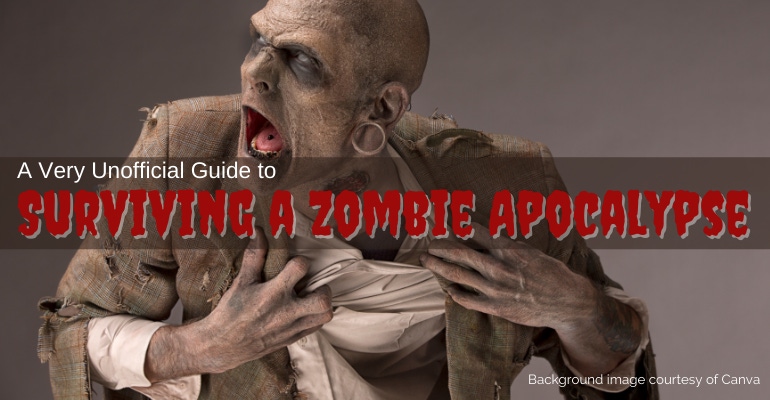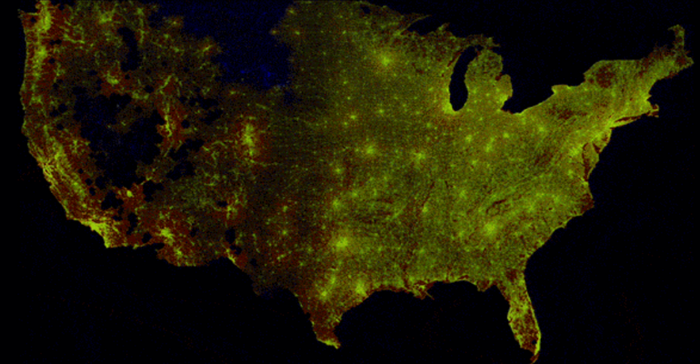The safest places to be, and what the CDC wants you to pack in your zombie apocalypse kit.
October 25, 2021

Maybe it's because Halloween is upon us, or maybe it's because I've been binge-watching The Walking Dead: World Beyond, but lately I've had Zombies on the brain.
Several years ago, a team of Cornell University researchers used statistical mechanics and techniques used in modern disease modeling and critical phenomena to explore how a zombie outbreak might spread across the continental United States. The researchers presented their work to the American Physical Society in 2015, and you can even play around with their interactive model, running simulations based on adjustable parameters such as "kill-to-bite ratio" and the estimated time it might take for a zombie to walk one mile.
"The idea of a deadly disease that not only kills its hosts, but turns those hosts into deadly vectors for the disease is scary enough to fuel an entire genre of horror stories and films," the study authors wrote in their introduction. "But at its root, zombism is just that: a (fictional) disease, and so should be amenable to the same kind of analysis and study that more traditional diseases have long benefited from."
According to the researchers' calculations, most of the United States will have been infested by zombies within four weeks. However, the simulations show that even after four months, remote areas of Montana and Nevada would remain free of zombies. Below is a screenshot of the interactive mapping tool, found here, showing what a hypothetical outbreak of zombies might look like in the continental United States, several months into the outbreak.

So your best bet is likely to head toward one of those two states, or hunker down somewhere in the Rocky Mountains. Or, if you're in Canada, this guide offers a list of the best (and worst) places for surviving an outbreak of zombies in Canada, based on things like population density, number of renewable energy sources, number of buildings with basements, number of hospitals, number of military bases, number of hunting gear shops, etc.
Here's what you'll want in your zombie apocalypse kit
Now that we have a general idea of where to run and hide from hypothetical zombies, let's consider what to pack.
Back in 2011, the Centers for Disease Control and Prevention (CDC) launched a tongue-in-cheek campaign intended engage the public with emergency preparedness messages, but it proved to be quite effective. The CDC notes on its zombie preparedness website that it continues to reach a wide variety of audiences on all hazards preparedness via "zombie preparedness." The website includes a blog, lesson plans for educators, and a graphic novel on the subject.
Below are a few items the CDC recommends putting in your emergency kit:
Water (1 gallon per person per day)
Food (stock up on non-perishable items)
Medications (prescription and over-the-counter meds)
Tools and supplies (utility knife, duct tape, battery powered radio, etc.)
Sanitation and hygiene (household bleach, soap, towels, etc.)
Clothing and bedding (a change of clothes for each family member and blankets)
Important documents (driver’s license, passport, birth certificate)
First Aid supplies (they won't do any good if you get bit by a zombie, but they'll come in handy for basic cuts and scrapes you might get while you're on the run - or during a more realistic emergency, like a hurricane or a tornado.
Once you’ve made your emergency kit, the CDC recommends creating a family emergency plan so that everyone in your family knows where to go if zombies start showing up in the streets — or during any number of more likely emergencies.
How would medtech respond to an outbreak of zombies?
I can't help but wonder how the medical device industry would respond to a hypothetical outbreak of zombies. If we learned anything from the COVID-19 pandemic, it's that this industry is full of really smart, hardworking people who are not afraid to jump in and start working on solutions to really big problems. From rushing supplies to the COVID-19 frontlines, to working around the clock to develop COVID-19 tests and new ventilators, to making sure those newly manufactured ventilators were properly tested, we saw countless examples of medical device and diagnostics professionals stepping up in the early days of the pandemic to help wherever they could.
So if there ever is an outbreak of zombies, I would count myself lucky to have a medical device engineer in my caravan. While researching and developing a vaccine would obviously fall under the pharmaceutical industry's purview, medtech minds would surely play a major role in helping us survive until a vaccine is available.
About the Author(s)
You May Also Like




.png?width=300&auto=webp&quality=80&disable=upscale)